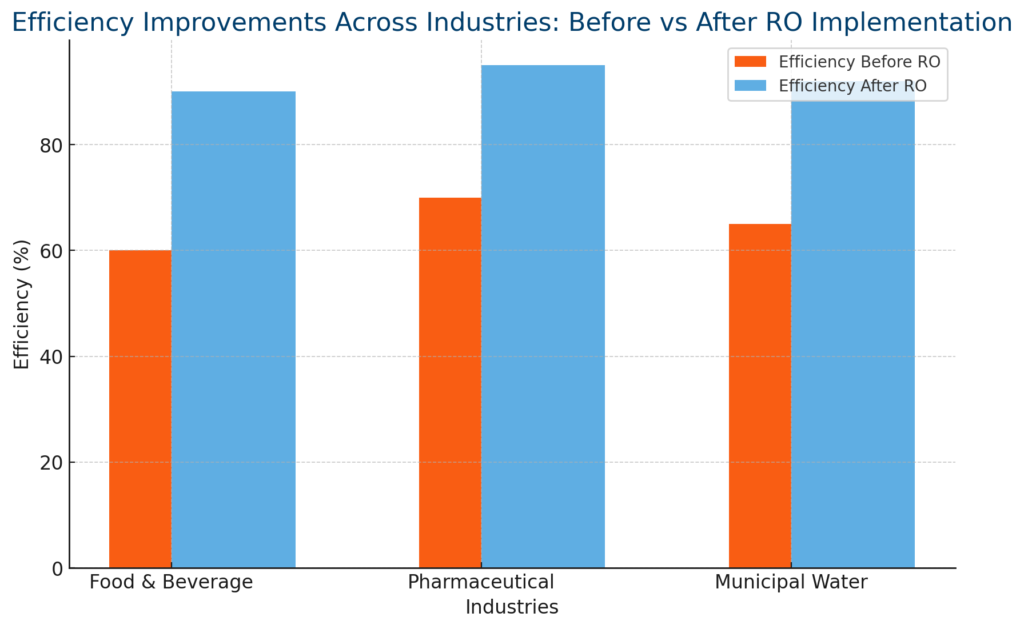Successful Implementations of Reverse Osmosis Systems: Industry Examples
Reverse osmosis (RO) systems have become a cornerstone of water treatment in various industries due to their effectiveness in removing contaminants and improving water quality. In this post, we will explore real-world examples of how different industries have successfully implemented RO systems, highlighting the challenges they faced and the solutions that led to their success.

Case Study 1: Food and Beverage Industry
Overview: A large beverage manufacturing plant faced challenges with the high mineral content in their local water supply, which affected the taste and quality of their products. Traditional water treatment methods were insufficient in maintaining the consistency needed for production.
Challenges:
- High mineral content causing taste inconsistencies.
- Inadequate filtration methods leading to frequent quality control issues.
- The need for a reliable and consistent water source for production.
Solution: The facility implemented an industrial-grade RO system designed to handle large volumes of water with varying quality. The RO system effectively reduced the mineral content and improved the overall water quality, ensuring consistency in the production process.
Results:
- Improved product taste and quality, meeting consumer expectations.
- Reduced instances of quality control issues related to water impurities.
- Lowered maintenance costs due to the reduced scale buildup in equipment.
Key Takeaway: Implementing an RO system in the food and beverage industry can lead to improved product consistency, reduced quality issues, and lower maintenance expenses, making it a valuable investment.
Case Study 2: Pharmaceutical Industry
Overview: A pharmaceutical company required high-purity water for its production processes, particularly for formulations and cleaning equipment. The existing water treatment system was unable to meet the stringent purity requirements, leading to production delays and increased operational costs.
Challenges:
- Need for ultrapure water to meet regulatory standards.
- Existing treatment system unable to consistently achieve required water purity.
- Production delays due to frequent system maintenance and water quality issues.
Solution: The company installed an advanced RO system with a multi-stage filtration process. This system provided the high level of water purity required, meeting the strict regulatory standards of the pharmaceutical industry.
Results:
- Consistent production of ultrapure water, ensuring compliance with industry regulations.
- Reduced downtime and maintenance costs.
- Improved overall production efficiency and product quality.
Key Takeaway: High-purity water is crucial in the pharmaceutical industry, and RO systems offer a reliable solution to meet regulatory requirements while enhancing efficiency and reducing costs.
Case Study 3: Municipal Water Treatment
Overview: A municipal water treatment facility was dealing with high levels of contaminants in the local water supply, including nitrates and heavy metals. The traditional treatment methods were not adequate to meet the growing demand for clean drinking water.
Challenges:
- High contaminant levels in the water supply, including nitrates and heavy metals.
- Need to meet stringent drinking water standards for the community.
- Limited capacity of existing treatment infrastructure.
Solution: The facility integrated an RO system into its treatment process, effectively reducing contaminants to safe levels and ensuring a reliable supply of clean drinking water for the community.
Results:
- Significant reduction in contaminant levels, ensuring compliance with drinking water standards.
- Increased capacity to meet the community’s demand for clean water.
- Enhanced public confidence in the safety and quality of the municipal water supply.
Key Takeaway: RO systems are effective in municipal applications for reducing contaminants and ensuring compliance with drinking water standards, providing a safe water supply to the community.

Discover How RO Systems Can Benefit Your Industry
These case studies demonstrate the versatility and effectiveness of reverse osmosis systems in addressing a variety of water treatment challenges across different industries. Whether it’s improving product quality in the food and beverage industry, ensuring compliance in pharmaceuticals, or providing safe drinking water for communities, RO systems offer a reliable solution.
Understanding the Realities of Reverse Osmosis
Understanding the realities of reverse osmosis systems is crucial for making informed decisions about water treatment. RO systems offer an effective and reliable solution for removing contaminants, improving water quality, and protecting industrial equipment. By learning from these successful implementations, it’s clear that RO systems are a practical, cost-effective, and environmentally friendly option for many applications.
If you have questions about how reverse osmosis systems can benefit your facility or need guidance on selecting the right system, contact us today. Our team of experts is here to help you make the best decision for your water treatment needs.
FAQs
Q: What industries can benefit from reverse osmosis systems?
A: Reverse osmosis systems are used in various industries, including food and beverage, pharmaceuticals, municipal water treatment, power generation, and manufacturing, due to their ability to provide high-quality water and remove contaminants effectively.
Q: How does reverse osmosis improve water quality in the food and beverage industry?
A: RO systems remove impurities such as minerals and contaminants that can affect the taste and quality of food and beverages, ensuring consistent product quality and meeting consumer expectations.
Q: Why is reverse osmosis important in the pharmaceutical industry?
A: In the pharmaceutical industry, water purity is critical for formulations, cleaning, and compliance with regulatory standards. RO systems provide the necessary level of water purity, ensuring product safety and quality.
Q: Can reverse osmosis be used for municipal water treatment?
A: Yes, RO systems are effective for municipal water treatment, as they can remove a wide range of contaminants, including nitrates, heavy metals, and other pollutants, ensuring safe drinking water for the community.
Q: What are the advantages of using reverse osmosis for industrial applications?
A: RO systems offer several advantages for industrial applications, including reduced chemical usage, lower maintenance costs, improved product quality, and compliance with industry standards for water purity.